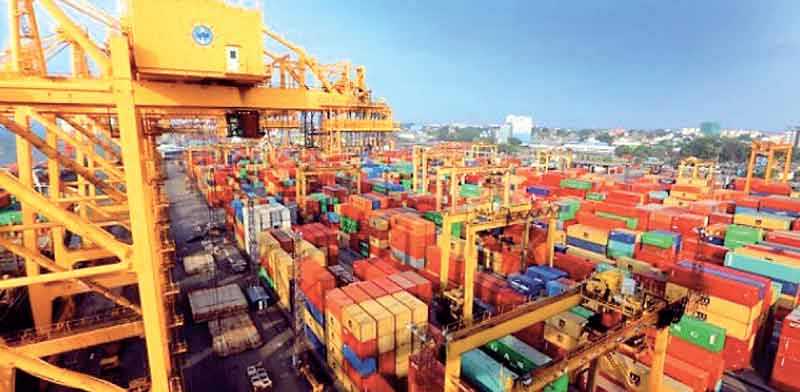Sunday Feb 22, 2026
Sunday Feb 22, 2026
Monday, 29 March 2021 02:23 - - {{hitsCtrl.values.hits}}

New study finds providing right support for businesses recovering from COVID-19 impact can set the foundation for longer term growth
The COVID-19 pandemic has given an opportunity for the Government to fast-track policy reforms, reduce red tape and support local businesses to expand and link with global value chains to underpin a stronger recovery needed to deliver sustainable growth to Sri Lanka, a new research conducted by a top business chamber has found.
The majority of respondents participating in the research undertaken by the Federation of Chamber of Commerce and Industry of Sri Lanka (FCCISL) and PwC said it could take six to 12 months more for Sri Lanka’s economy to recover from the pandemic.
However, they were also optimistic that if the Government and other stakeholders followed outlined actions and recommendations a resurgence in business activity could lead to sustained growth that has eluded Sri Lanka over the past few years.
The study, which captured insights from 300 business establishments, looked at a comprehensive cross section of companies including large corporates, start-ups and medium-sized enterprises.
A staggering 89% agreed they were adversely effected by COVID-19 but 55% of companies found alternative opportunities as a result of the pandemic and were able to utilise resources and collaborations to keep their heads above water.
“Businesses in certain sectors, such as ICT, Manufacturing and Education, were amongst those to identify opportunities for new products and services, whereas construction and transport and storage sectors reported less opportunities in the immediate aftermath of the pandemic,” the study found.
Only 23% of companies were able to utilise moratoriums and other relief measures announced by the Central Bank while smaller businesses had to rely on financial support from family, friends and well-wishers. A significant 71% predicted it would take six to 12 months for the economy to recover to some extent after re-opening, provided COVID-19 uncertainties were well-managed. Companies involved in Transport and Storage, Accommodation and Food Services along with Manufacturing expect a longer path to recovery.
The respondents had recommended a multi-stakeholder effort to address a broad spectrum of areas that can enable the post-pandemic recovery and growth of local enterprises. These market development initiatives include introducing business support programs to inform and enable businesses to diversify product or service offerings, establish transparent policies and incentive schemes to encourage continuing investment to increase capacity for local sourcing into key industries, and promote export market linkage programs by identifying specific growth markets for high potential industries in Sri Lanka.
The study also backed establishment of industry development and innovation cells through industry and academia collaborations in order to ideate and commercialise new products and solutions, and promote domestic business linkages and business matching along with inter-industry and intra-industry collaboration efforts by establishing suitable platforms, multi-sector think tanks, promotional programs and recognition events.
Capacity development initiatives included training programs on areas such as business planning, business continuity planning and financial management for businesses to practice better financial discipline and develop resilience by performing informed scenario planning and cash flow forecasting, develop national policy for retention of skilled local talent as well as strategies for global knowledge transfers, lifetime skills education and competitive workforce development and provide financial grants, tax relief for expenditure incurred by businesses toward up-skilling or reskilling employees, especially to businesses attempting to refrain from downsizing or pivot into new business segments.
FCCISL also said it would work with the Government and other stakeholders to introduce a government loan guarantee scheme which enables businesses – especially geared towards MSMEs – to access collateral free credit from financial institutions, further simplify access to low cost financing from financial institutions for working capital requirements and provide financial support and low-cost financing for businesses seeking to adopt new technology or undertake business transformation in an attempt to position to recover and grow in the post-pandemic environment.
“Introduce supportive policies, tax incentives and investment structures to enable the creation of fund pools outside of the formal financial sector, including through FDIs, bilateral and multi-donor funding, to invest in promising private sector enterprises; e.g., Business acceleration funds to fast track high potential SMEs to reach global markets; Tech funds to invest and promote industry modernisation, digital transformation, tech-enabled start-ups,” the study said.
Business environment improvement initiatives recommended included simplify and streamline the provision of government services, develop and maintain a comprehensive information portal to guide entrepreneurs/investors starting any new venture, reduce cost of utilities, and introduce legislation that promote flexible work arrangements and increase female labour force participation.
Other initiatives were allowing for more digital payment options in order to simplify and reduce cost of ecommerce and international transactions, introducing contemporary bankruptcy laws and increasing the availability of land in regional industrial zones.